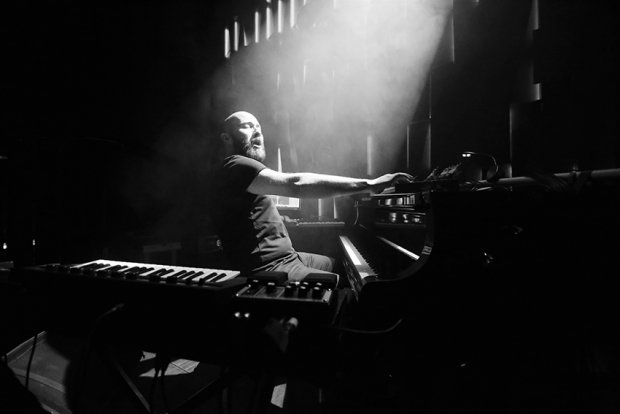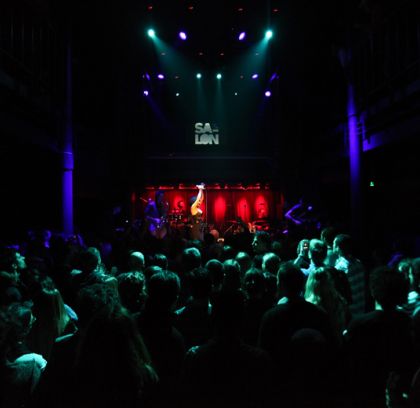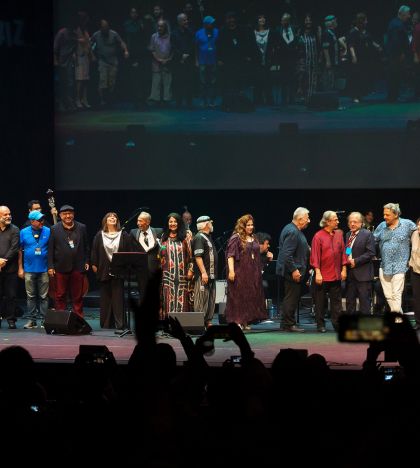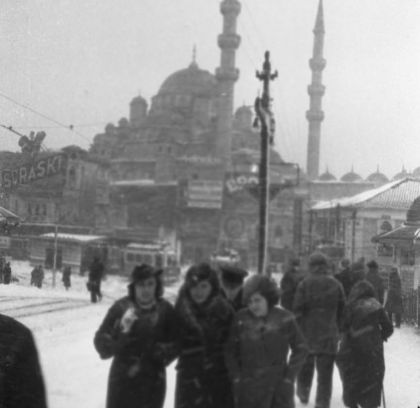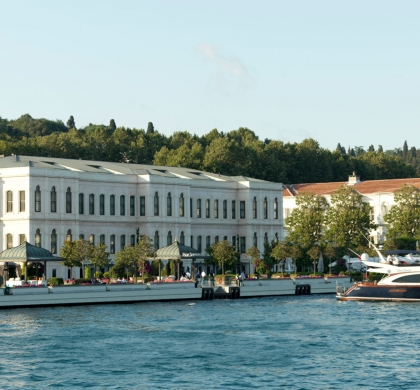The second concert I attended during the İKSV İstanbul Jazz Festival took place at Salon İKSV (the İKSV HQ performance space) in Şişhane, Beyoğlu, on June 27. The group responsible for the music – but not for the weather outside, which was spectacularly stormy – consisted of pianist Çağrı Sertel (photographed above), who was also the composer of the pieces, guitarist Sarp Maden, saxophonist Engin Recepoğulları, double-bassist Volkan Hürsever and drummer Volkan Öktem.
With two volcanos in the group, a guitarist whose name and surname (Sarp Maden) mean ‘precipitous metal’, not to mention a pianist called Sertel (‘hard hand’), it was perhaps hardly surprising that the music they made should have been somewhat abrasive. This was not a concert devotees of the anodyne would have enjoyed. Easy listening? Forget it. On this occasion Mary Poppins was using her umbrella to do aikido, having sharpened the ferrule to a point and tipped it with a dastardly nerve agent.
The music was extremely loud, as well as full of weird, incisive and sometimes downright gut-whacking chords (as if Schoenberg had been commissioned to write for the Wehrmacht). However, the only regret I have on that score is that the enormously amplified eruptions of bass and percussion sometimes made it difficult to hear the piano’s upward jaunts into the top octaves. But what eruptions they were! The two Volkans between them certainly know how to get you fired up. Just stand there and let the white-hot lava flow over you… What could be nicer?
Çağrı Sertel received his training at the Music Faculty of Bilgi University, an institution that produced – before the lamentable closure of its jazz department – a large number of fine jazz musicians. He had the good fortune to be a pupil of both Tuna Ötenel (described in my previous blog) and Ali Perret. It shows. Here is a man to watch.
My visit to the İKSV Concert Hall the afternoon before the concert had an ulterior motive: not only did I wish to listen to the group’s rehearsal and sound check and thus meet them informally, but I also wanted to wangle a free ticket to the evening’s gig. Having already trespassed extensively on the generosity of Ms Derya Bozcuk of the İstanbul Kültür ve Sanat Vakfı in the matter of concert invitations, I did not feel I had sufficient face – here, I am translating the Turkish phrase ‘yüzüm yoktu’ – to ask for more. (My heartfelt thanks go to Derya Hanım for the many tickets she has kindly provided, by the way.) But in the event the concert was so poorly attended that there was no shortage of jiving room on the dance floor. There cannot have been more than 30 people in the audience for what was one of the best jazz concerts I have ever been to.
Standing outside the concert hall in Şişhane that afternoon and looking out over the six-lane highway swooping down to the Golden Horn, I brought to my mind’s eye the view I would have seen from the same spot in the early 1980s, when I was living close by – at the Tünel end of İstiklal Caddesi. Then the road would have been a modest two-lane affair instead of the mega-screamway it is now. On the far side of it there would have been a scruffy tea garden where one could sit on rickety wooden chairs and drink acrid, overbrewed tea among the narghile smokers, discarded cigarette butts and mangy cats.
Further to the right would have been Tepebaşı Gazinosu, where of a summer evening families would sit on the terraces amid the pine trees that adorned the slope leading down towards Kasımpaşa. This oasis of innocent pleasure is now, alas, gone – decimated by the widening of the road that runs from below the British Consulate to the lower end of the Pera Palas Hotel – though I see that a few pine trees are still hanging onto the upper part of the slope on the leftward side of the Kasımpaşa Football Stadium.
In the summer of 1980, having just moved into my flat at the back of Botter Han in İstiklal Caddesi (this being the Art Nouveau building between the Swedish Consulate and Starbucks that is now boarded up, thus concealing the stone carvings on its grimy facade), I would take my guests to Tepebaşı Gazinosu to drink tea from a hissing samovar while being entertained by Turkish jazz groups and comedians, the sound of the saxophone competing with the cries of the swallows circling and weaving overhead as the sun set over the minarets on the far side of the Golden Horn.
While we are still lost in a mind-numbing haze of nostalgia, I would like to draw your attention to this video of İstanbul in 1964 (expertly filmed by a French camera crew) to which someone has had the excellent idea of adding the Andante Cantabile movement of Beethoven’s Archduke Trio as a soundtrack:
We are not finished with the past yet, however. Before this trip down memory lane comes to a dead end (as such indulgences on the part of Time’s Laughing Stocks inevitably do), I would like to share with you a short video of the building whose entrance on İstiklal Caddesi I would use to gain access to my flat at the rear, which overlooked the side of the Russian Consulate and which can now be viewed from the windows at the back of Starbucks – you will see it on your right, the entrance being up a short flight of steps leading to a ramshackle porch. I lived there for 33 years.
The following two videos show the neighbouring buildings to the right and left – Union Han, and Arda and Tunca Apartments.
My acquaintance with jazz musicians stems from my time at this flat, which is a mere stone’s throw from the performance club Babylon in Asmalı Mescit and not too far from the Nardis Jazz Club in Galata – thus making it a convenient stopover on the way to or from their stints on stage. One visitor was Sarp Maden, who is currently the guitarist of Çağrı Sertel’s group. In a piece I wrote in 2006 on Quartet Muartet, the band he then played in along with pianist Genco Arı, bass guitarist Alp Ersönmez and drummer Volkan Ökten, I had this to say of Sarp and his style of playing:
‘Sarp’ means ‘steep’ or ‘precipitous’ in Turkish (and it is worth noting that cliffs are inaccessible places), while ‘Maden’ just means ‘mineral’ – a surname no guitarist would turn his nose up at, surely. Refusing to be pulled off centre by considerations of glamour is consistent with the demanding strictness of a Scorpio with Saturn in Aries. He may dominate the stage with his arpeggio explosions testing the limits of the gamut, but he is not going to be accused of doing it to court popularity.
It is sweetness that seems to give him pain – the heavy-duty arpeggios (Sarp can be ferocious in his atonality) tail off into an unexpected melody right at the top of the range but played with a wistful, light-filled liquidity (Scorpio is, after all, a water sign) that few guitar virtuosi can hope to achieve in this register. No, it is not pleasure. As he throws up ball after ball of coloured liquid (is it nectar, or is it poison?), his face screws up with agony.
In recalling his days as the leading force in Quartet Muartet, I do not wish to imply that Sarp (pictured below on the left of the group) attempted to dominate the stage last Wednesday night: he is far too experienced a musician to do anything like that. Indeed, the parts of his performance that I most enjoyed were probably those where he was playing in unison with Çağrı’s extended flights of imagination on the piano and organ. As far as his solos are concerned, all I can say is that he continues to improve on an already impressive record of past achievements.
Listening to Çağrı Sertel for the first time gave me, primarily, a feeling of relief – that Turkey is still capable of producing musicians of this calibre. It is good to know that the Pierian Spring is not about to run dry in this neck of the woods, whatever cultural taboos our elders and betters may wish to impose on the populace. His most outstanding feature – apart from the technical aspects of his pianism and his inventiveness as a composer, both of which are outstanding – is his impeccable taste: he knows exactly when to change timbre and register, when to pull the stops out, and when to draw in his horns (both in the sense of withdrawing from prominence in the ensemble and in that of bringing in his saxophonist at the right moment).
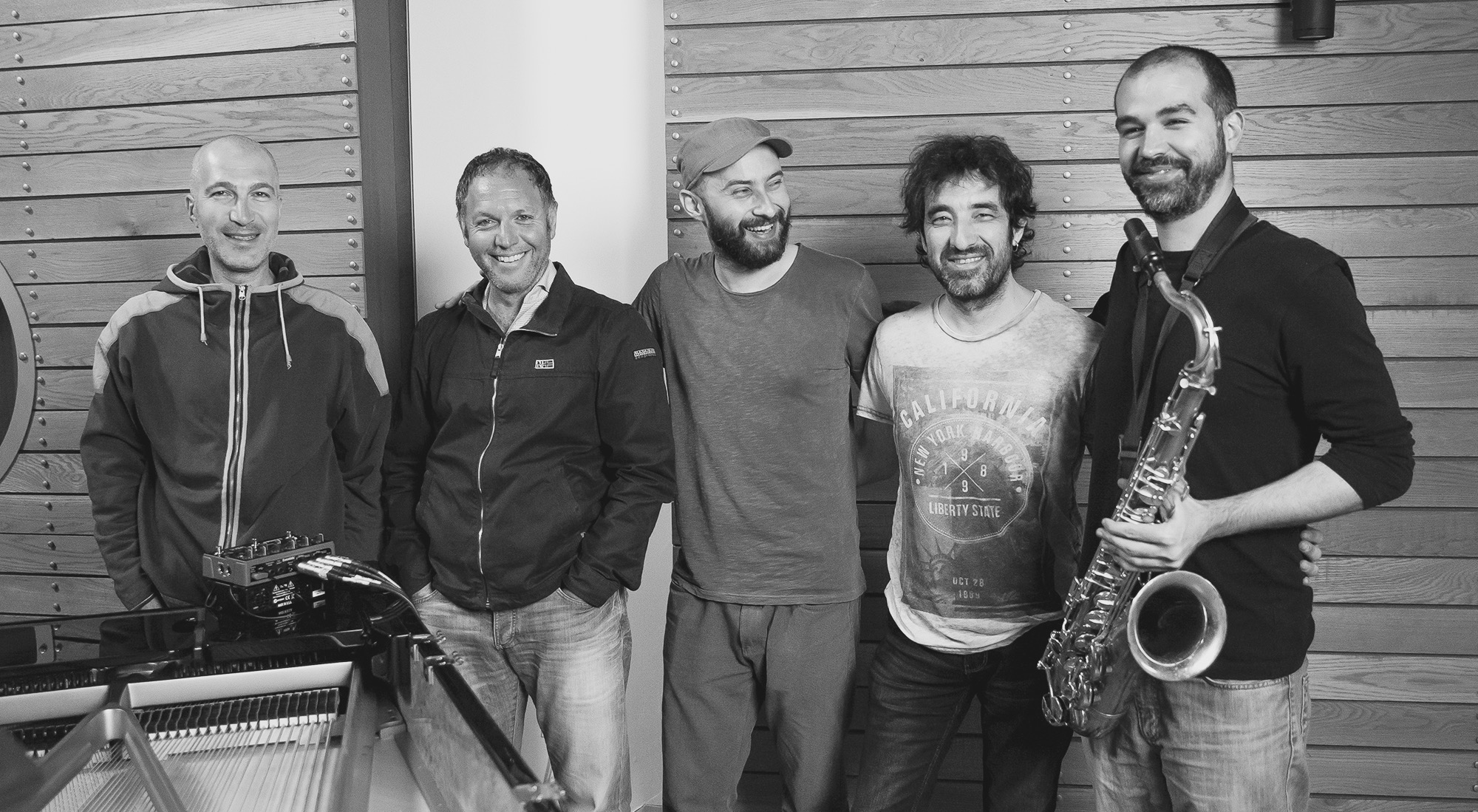
Çağrı (centre) has certainly chosen the right partners: Volkan Hürsever on double bass (2nd from left), with his classical training and technical excellence, and Engin Recepoğulları (far right) with his ‘rip-your-heart-out’ bursts of passion on sax. And as for Volkan Öktem the drummer (next to him), he is so good that his accompaniment can make even the least inspiring solo from a partner sound musically satisfying. If you ever start feeling bored and listless during a concert, concentrating on what Volkan is doing will soon restore you to good humour: his playing is a feast on its own. I will now reproduce another extract from the piece I wrote in 2006:
When it comes to drummers, the important thing (I myself believe) is not what they do, but what they don’t do. Volkan Öktem does not, under any circumstances, play too loud. He does not drown out other people’s solos. He does not compete with the bass part; he co-operates with it. Having heard him play from a distance of three feet in a crowded club, I can assure you that what he does is extremely subtle. He does more than he has to, and often (it seems to me) more than ninety percent of the audience are aware of, to make life just that bit more interesting. Who is to know that he changed the timing of the cymbal hits the second time round? Volkan is. That seems to be enough for him.
It is traditional to make some sort of criticism in a review of a concert – as an offering to the dark goddess Hecate, perhaps – so I will make a couple. Firstly, the slow piece that was the second item on the programme fell into the trap that yawns beneath any work of music that relies heavily on the creation of a mood: it lacked a sense of direction. I must add at once that the melancholy atmosphere of the piece would in itself be enough to satisfy anyone but an ultra-formalist, restrictive-Saturn-in-fussy-Virgo person like myself. I feel, rightly or wrongly, that the chord progressions in a slow movement should lead somewhere. As an example of how this can be achieved (although with diatonic chords rather than atonal ones), here is Canope, from Debussy’s Préludes Book Two. The pianist is Krystian Zimmerman, who on this occasion is thankfully not playing too fast:
I must hasten to add that Çağrı Sertel’s compositions are not fully atonal. In spite of the occasional ventures into the uncharted stratosphere, they do have a diatonic basis. And while on the subject of atonality, I would like to invite the reader to listen to Samuel Andreyev’s expert analysis of a song by Captain Beefheart from the landmark album Trout Mask Replica, which first brought an atonal flavour and seemingly chaotic rhythms to rock music:
The sound of Trout Mask Replica is as modern and original today as it was in 1969, when it first appeared. If you have not already heard it, you must be living on a rock. (Joking aside, I highly recommend that you listen to it for as long as you can stand the bewilderment and disorientation; you are allowed only ten exclamatory WTFs, so use them sparingly.) Here is the full album:
To return to the concert on Wednesday, my second criticism is that Volkan Hürsever, although undoubtedly one of Turkey’s finest double-bass players and a former teacher of the instrument at Bilgi University (where else?), seems to prefer to have his solos scripted or at least rehearsed, rather than having to improvise them on the spot. This is not to deny his outstanding talent – here is a video of him playing in Belgrade (the long and lovely solo starts at 03:34):
But that is really all I can find to carp at: it is high time I let the music take over. Here is ‘Juno’ from Çağrı Sertel’s album Instant. This video features some close-ups of the sensitive fingers of the pianist and the double-bass player:
And now, ‘Saturation’ from the same album:
If you wish to listen to the whole of Instant, here it is on Spotify (dead easy to sign up for).
To my great regret, I have not yet been able to find a video of Engin Recepoğulları performing solo on YouTube. I will keep looking.
One thing I have no regrets about, however, is the fact that thanks to my absence at the concert I was not at home to deal with the effects of the storm that was raging outside. In fact, when I got back to my humble residence at a late hour I found that the lashing rain had resulted in a puddle on the floor (the flat being directly under the leaky roof of the building). But it was worth it. Anyway, what do you expect on a night when a full moon conjunct Saturn is only a few hours away, and moreover when this latter planet (traditionally known as the Greater Malefic) is in the same sign as Pluto and Black Moon Lilith? I now have a place just inside the door where the lino has swollen up, it is true, but I also have a memory of an unforgettable evening’s jazz.

